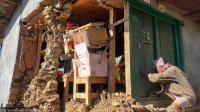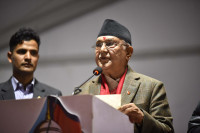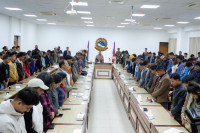Opinion
Bikram Sambat association
Nepal could bring together the countries that follow the Bikram Sambat lunar calendar to boost regional tourism
Hari Man Lama
For most Nepalis, Bikram Sambat refers to the official calendar of Nepal, in which the New Year is celebrated on the 1st of Baisakh (mid-April). This day bids farewell to the year gone by and welcomes another. People look forward to this day with new hope, aspiration, and determination. The start of a new year is an occasion to gather with friends and families and make merry. It is also a moment to review the past year, with pleasure if the year had been favourable, and with renewed determination to change things if the year had been forgettable. In Nepal, this moment comes on the last day of Chaitra and on the first day of Baisakh each year.
The Bikram Sambat calendar, however, is also in use beyond Nepal and the New Year is observed with great enthusiasm throughout South and Southeast Asia. In India, for instance, it is observed in Assam, Bengal, Kerala, Kashmir, Manipore, Orisa Punjab, and Tamil Nadu. The Indian constitution even states that “Margasheersh Sukla Saptami Sambat 2006” was the day of the promulgation of the constitution. Other countries that follow the Bikram Sambat calendar include Sri Lanka, Myanmar, Cambodia, and Thailand. In these countries, the New Year falls also in the month of Baisakh, with slight variations in names and nature of celebration. Some parts of Indonesia, Malaysia, Bhutan, and Bangladesh also follow the Sambat calendar as well.
Shared cultures
The countries that follow the Sambat years share many things in common in terms of religion, culture, traditions, and ways of life. The Bikram Sambat is associated with Hinduism and Buddhism. According Hindu mythologies, Hinduism originated in present-day Nepal and India. From there on, it spread to other parts of South and Southeast Asia. Nepal and India were also home to Buddhism. Gautam Buddha was born in Lumbini of Nepal, attained enlightenment in India, and his teaching of peace spread to many parts of the world, including Myanmar, Sri Lanka, Thailand, Vietnam, Laos, Cambodia, Thailand, Japan, China, Korea, and Mongolia.
The month of Baisakh in the calendar of the Bikram Sambat is closely linked to the ideals, principles, and philosophies of Lord Buddha. Major events in the lives of the Buddha—his birth, death, and great deeds—took place in this very month—on Baisakh Purnima, the full moon night.
The countries that are culturally close, religiously tied, and traditionally linked in lifestyles also share common ethnic, social, and economic values. They have potential to work together towards common goals, which will benefit them all. This is true in the case of South and Southeast Asian countries. Many countries in these regions have identical values and norms. Cultures do not have any territorial borders. Traditions belong to peoples and have no political barriers. And religions go beyond geopolitical demarcations. Trade and commerce are about give-and-take, with a margin for profits. Efforts at working together, despite political boundaries, have already been observed in the formation of the European Union, the Association of South East Asian Countries (Asean) and the South Asian Association of Regional Cooperation (Saarc).
Under one calendar
In the context of the Bikram Sambat calendar, it is clearly evident that the calendar is not only limited to Nepal, although officially it is celebrated country-wide and all government-related events take place on the basis of this calendar. Since the calendar system is religiously and culturally significant in many states of India and in many other countries of South and Southeast Asia, these states and countries can come together to promote the system, its values, and importance. If such an association, involving public and private stakeholders, is formed, there is a great potential for generating tourism.
The association would also familiarise people with each others’ cultures under the Bikram Sambat. Government agencies looking after tourism development and cultural affairs in the countries of the association could then focus on travel trade, opening travel agencies and hotels, and operating airlines. Since Nepal adheres to the Bikram Sambat as its official calendar, it is advisable that Nepal take the lead. Such an initiative would promote Nepal’s tourism industry and boost her image abroad, as well.
Lama is a tourism entrepreneur




 15.12°C Kathmandu
15.12°C Kathmandu










